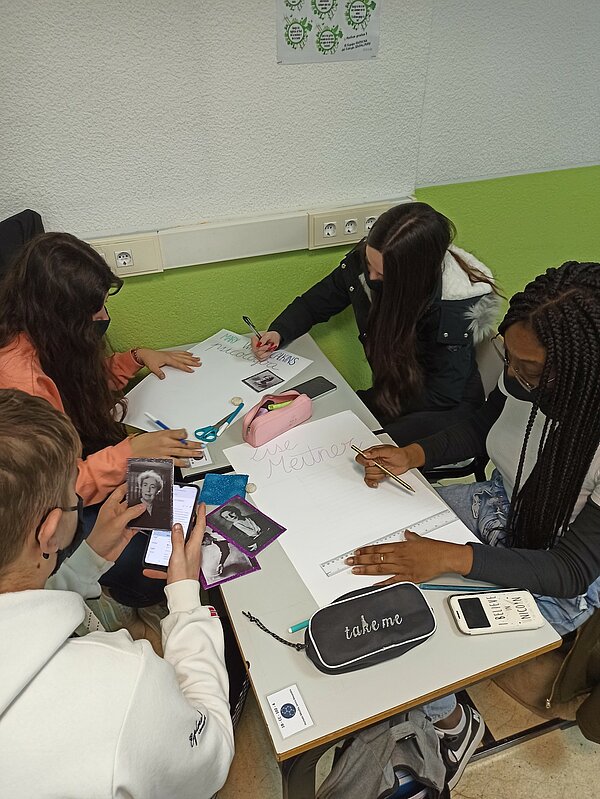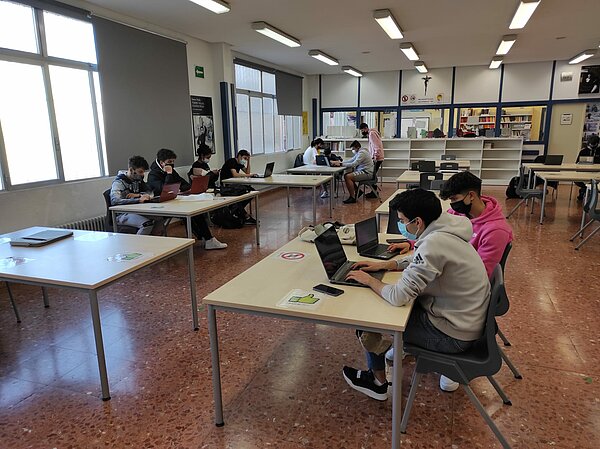World Citizenship Academy: Young people from the Brainport region optimally prepared for an international future

The Brainport region is becoming increasingly international in character. And not just because of the many knowledge workers who find jobs here. There are also lots of migrant workers and asylum permit holders settling in the region. This international society also translates into the classroom. To prepare students optimally for an international future, a programme has been developed in Brainport Eindhoven that focuses on the internationalisation of education. One of the things to come out of that is a cooperation project between schools in the Brainport region and the Basque country in Spain.
How do you prepare young people for an international future? ‘By bringing them into contact at an early age with peers who speak a different language and have a different cultural background.’ That is the view of Emma Claessen, project manager of the WCA on behalf of Brainport. She explains what the project entails: ‘The World Citizenship Academy is a two-year pilot project in which nine secondary and vocational schools are currently taking part. These schools are spread across the Netherlands and the Basque Country. Classes from the Dutch schools were matched with classes from schools in Bilbao and the surrounding area. In mixed teams, the students worked on social challenges set by the teachers, which are linked to the Sustainable Development Goals of the United Nations. The goal is to create more awareness of world citizenship, to strengthen the students’ intercultural skills and expand the network of the schools.’

ROC Ter AA
One of the participating schools is ROC Ter AA in Helmond. Marinda Boeren, English teacher in training and supervisor of the WCA project, is enthusiastic about the pilot. ‘Our participating senior secondary vocational students are training as ICT Software Developers. In the ICT industry, it is extremely important to be able to work with people all over the world. Through their participation, the students experience early on what it is like to work together internationally, even if it is currently only online. This is extremely useful for their International Communication exam.’ The eTwinning online platform set up by Brainport is an indispensable part of the project, says Marinda. ‘Through this platform, the pupils show each other their presentations and videos.’
‘Not easy’
Denzel is one of the ROC students participating in the WCA. He is now in a fixed group with a few students from the Basque Country. ‘Initially I was a bit sceptical, but now I see the benefits of the project. In our field of work, we often have to deal with other cultures. So it is useful to learn about this while you are still at school.’ The students in the group have gained a better understanding of each other's customs and traditions. Even so, some things remain difficult. ‘We, the Dutch, will be ready for an online meeting on time, while they log in half an hour later than agreed. And what is most inconvenient, is that holidays don't coincide, so we often have to reschedule meetings. It is not always easy to communicate with people from abroad.'

Different perspectives
One of the tasks Denzel and his team are working on is to discuss traditions.’ Earlier, Sinterklaas and bullfighting were discussed. It was an eye opener for the student: ‘What is perfectly normal for us can be very peculiar to the Spanish. The same applies the other way round, of course. By keeping an open mind and listening to all the views, you get a different perspective on traditions.’ Marinda adds: ‘Sinterklaas and bullfighting are both traditions that are only celebrated in one country. So they are perfect material for comparisons.' The task Marinda gave the students was to modernise their tradition. Denzel is still working on it: ‘The intention is to present these festive events in a new format, with feedback from Spain. I look forward to seeing their presentation!’
The results of all students are presented through self-created websites, vlogs, blogs and podcasts.
Reactions to the pilot project from the Basque Country are also very positive. The Spanish students especially liked cooperating with foreign students and getting to know different customs:
‘I was very curious about working with students from another country. And it was fun: I learned about the traditions, the way of thinking and the way of working of Dutch students. In addition, they were really helpful in the project right from the beginning and made the group fun. I hope to work with students from other countries more often, because it is certainly worth repeating.’ - Thomas
‘I found the project a wonderful experience. I love working with people from other countries and learning about other cultures. During the project, I was able to talk to different people about traditions and cultures, also to people from other groups. So I was definitely able to get the most out of it. Dutch youngsters Joep and Juul also created a great website. I am not good with computers, so I left that to them. It is great to be able to divide the work in this way. I am happy with our end result and hope that I will be able to work with foreign students a lot more in the future.’ - Semmy
I am very pleased that everyone was so keen to participate and how well we communicated during the project. Everything went quickly and smoothly. I especially enjoyed getting to know the Netherlands and the Dutch better. In addition, I can now express myself better in English.’ - Pablo
Inspiration and participation
The first year of the pilot project is currently being evaluated. The results from the nine participating schools will be carried over to the next school year. The project may well be expanded to include more schools and cooperation with other countries. Emma: ‘We aim to collate all the results from this year and any new challenges that are created and make them available to schools in our region. We hope that the next groups and even new generations of students and teachers may gain knowledge and inspiration from this.’
Want to know more?
If you would like to know more about WCA or join the pilot project, contact Emma Claessen